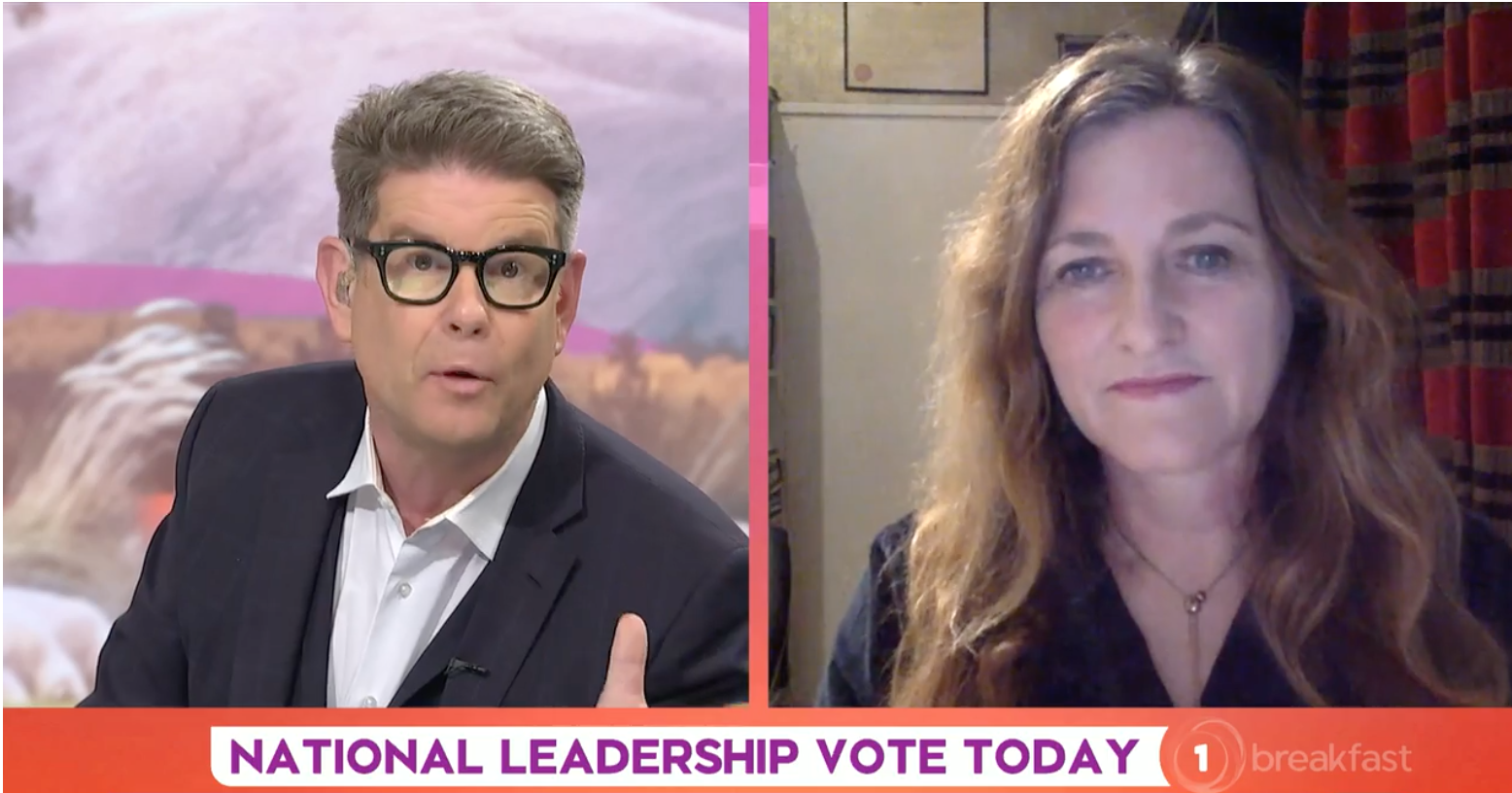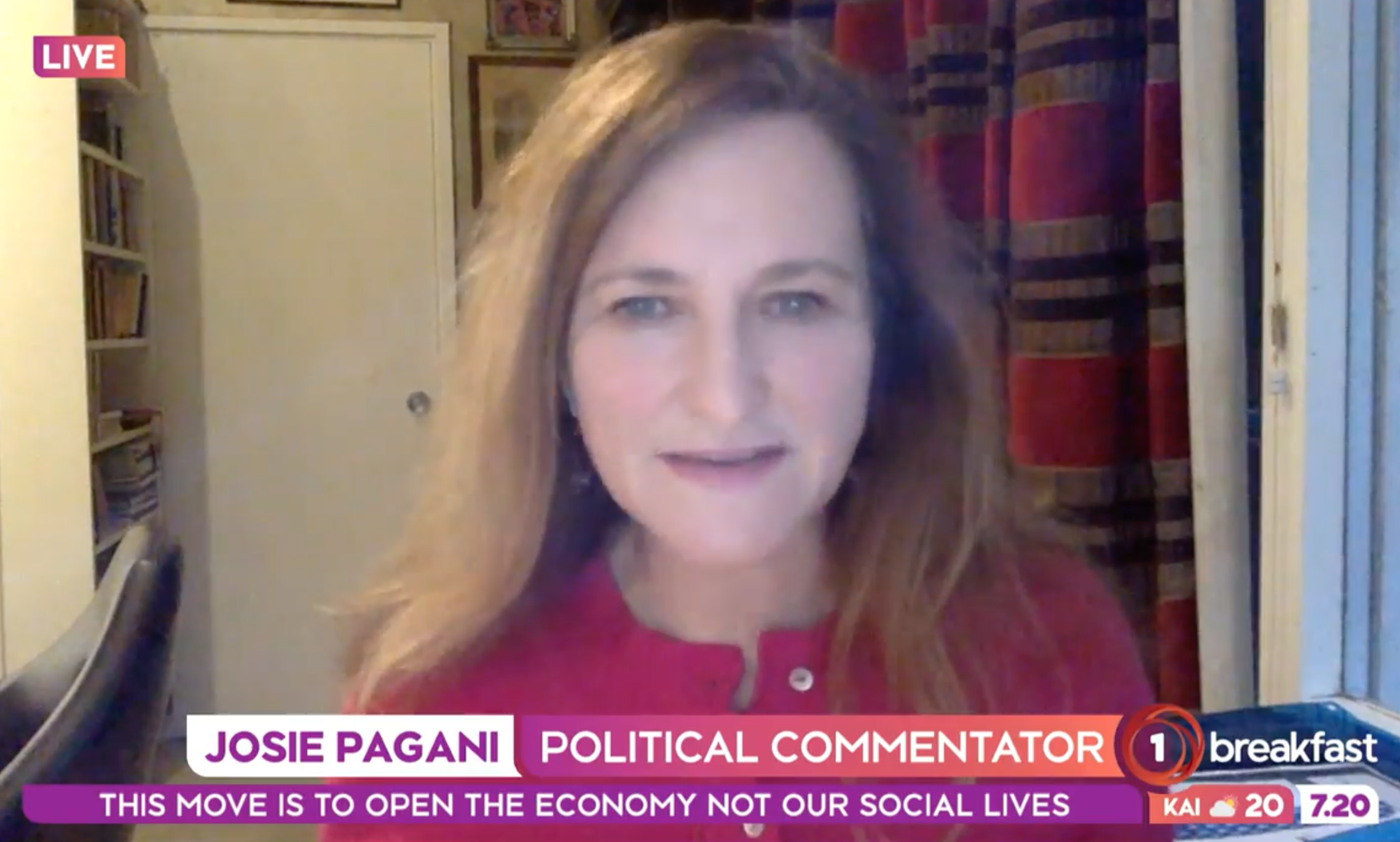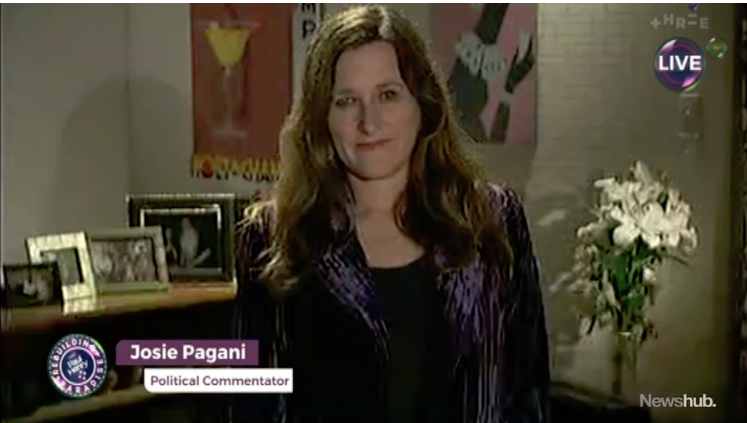STRAIGHT AND TRUE
May 2020
The Huddle: Vaccine free-for-all, visa holders stuck overseas
27/05/20
There is set to be a vaccine free for all at some point, but the Government has put their foot forward to help research locally. The Government has allocated $37 million for local development of a Covid-19 vaccine to join the international efforts. It has also created a vaccine strategy and a taskforce to overseas its implementation.
Josie joined Newstalk ZB's The Huddle to discuss.
Josie joined Newstalk ZB's The Huddle to discuss.
National Party Leadership
22/05/20

Former Australian PM Paul Keating once said, ‘In the race of life, always back self-interest — at least you know it's trying’. On TVNZ's Breakfast, Josie said that is the way to analyse the National Party leadership challenge, following a poll putting the party below 30%.
On Newstalk ZB she joined Trish Sherson and Andrew Dickens on The Huddle.
NZ Herald column on Budget 2020
15/05/20
Despite the eye-popping numbers, this is a cautious Budget. A trickle-up Budget with the emphasis on "trickle".
I hope Treasury's forecasts are right because they see the economy bouncing back much faster and taking a smaller hit than I expected. Consequently, the cash relief for families is smaller than I hoped.
But free job re-training, the big, immediate environmental stimulus and state house building programmes are all great decisions.
Read the full piece here.
I hope Treasury's forecasts are right because they see the economy bouncing back much faster and taking a smaller hit than I expected. Consequently, the cash relief for families is smaller than I hoped.
But free job re-training, the big, immediate environmental stimulus and state house building programmes are all great decisions.
Read the full piece here.
Increase In Aid Budget Welcomed, As Pacific Faces Crisis
14/05/20
Aid charities welcomed the government’s decision to increase the aid budget today with an additional $55.6 million.
“Government budgets across the world are under huge stress, and it reflects the values of New Zealanders, that even in tough times we don’t abandon our families and friends in our own region,” says Josie Pagani, Director of the Council for International Development (CID).
Although New Zealand faces the decimation of its own tourism industry, in Pacific countries, tourism can be as high as 70% of GDP in the Cook Islands for example where up to 35% of the population is employed. In Vanuatu, also struck by Cyclone Harold during lockdown, tourism is about 47% of GDP and employs about 27%.
The sudden increase in unemployment is leading to food insecurity in some communities, an increase in law and order incidents, and challenging the ability of governments and businesses to pay salaries for those still in work.
“New Zealand’s aid, along with Australia and other donors is more important than ever, both to respond to urgent need, and also to support the region to rebuild. We really do share a Pacific destiny. If we can keep COVID-19 out of the region, then we protect New Zealanders from a second wave too.”
CID called on the government to accelerate planning for a Pacific Bubble with New Zealand and Australia so that the region can start to attract tourists in the near future.
Pacific community organisations have identified the following as priorities:
“New Zealand has a unique role globally to persuade others to speed up debt relief for some of the most indebted countries, while continuing to do our bit to respond to some of the worse humanitarian crises.”
According to the World Food Programme, more than thirty countries in the developing world could experience famine. There are already one million people on the brink of starvation as a result of COVID’19 lockdowns in some of the poorest countries.
“Government budgets across the world are under huge stress, and it reflects the values of New Zealanders, that even in tough times we don’t abandon our families and friends in our own region,” says Josie Pagani, Director of the Council for International Development (CID).
Although New Zealand faces the decimation of its own tourism industry, in Pacific countries, tourism can be as high as 70% of GDP in the Cook Islands for example where up to 35% of the population is employed. In Vanuatu, also struck by Cyclone Harold during lockdown, tourism is about 47% of GDP and employs about 27%.
The sudden increase in unemployment is leading to food insecurity in some communities, an increase in law and order incidents, and challenging the ability of governments and businesses to pay salaries for those still in work.
“New Zealand’s aid, along with Australia and other donors is more important than ever, both to respond to urgent need, and also to support the region to rebuild. We really do share a Pacific destiny. If we can keep COVID-19 out of the region, then we protect New Zealanders from a second wave too.”
CID called on the government to accelerate planning for a Pacific Bubble with New Zealand and Australia so that the region can start to attract tourists in the near future.
Pacific community organisations have identified the following as priorities:
- Food security and water (support for primary producers to get food to markets, and to open up supply chains).
- Strengthen the health system (some countries have only a few ICU beds and little PPE equipment).
- Make the borders safe (support to have temperature checks and systems in place).
- Digital connectivity (so that health professionals for example can ‘sit in’ on operations and clinics while still in New Zealand).
- “Now more than ever we have to get smarter at spending New Zealand’s aid dollars. It’s not just about increased funding. It’s about a new way of working, including greater collaboration amongst our charities, and with New Zealand businesses working in the Pacific, and government departments,” says Josie Pagani.
“New Zealand has a unique role globally to persuade others to speed up debt relief for some of the most indebted countries, while continuing to do our bit to respond to some of the worse humanitarian crises.”
According to the World Food Programme, more than thirty countries in the developing world could experience famine. There are already one million people on the brink of starvation as a result of COVID’19 lockdowns in some of the poorest countries.
What I want to see in the 2020 Budget
13/05/20
Should the government spend to help stabilise business so that the recovery will trickle down to everyday families in jobs, or should cash go straight to families in the belief that spending will trickle up to businesses as we storm back to cafes, furniture stores and garden centres?
Politics is about choices.
Therefore I would like to see two main pillars to the recovery: First, send money directly to the poorest and to working families. Trust us to spend it right.
Second, pour money straight into projects that can get going immediately - within a month.
Read Josie's view on how to go about rebuilding from the crisis.
Politics is about choices.
Therefore I would like to see two main pillars to the recovery: First, send money directly to the poorest and to working families. Trust us to spend it right.
Second, pour money straight into projects that can get going immediately - within a month.
Read Josie's view on how to go about rebuilding from the crisis.
PMA online talanoa
11/05/20
The Pasifika Medical Association (PMA) is a network of Pacific health professionals working collaboratively to strengthen Pacific health workforce capacity and meet the health needs of Pacific people across the region.
Seventy-eight leaders in the business, government and health sectors, tuned into an online seminar to hear the Pasifika Medical Association CEO, Debbie Sorensen, share about the organisation’s experience during crisis and their priorities in a post-COVID 19 world.
The Council for International Development hosted the web event as part of a series of weekly Zoom seminars. CID invited Debbie to talk about priorities are for health organisations and what the new normal would look like in aid and development in the Pacific.
Josie says Debbie’s 60-minute presentation has been one of their most popular seminars. “It shows there is a real interest in listening to Pacific voices and what the priorities are in terms of health.”
One of the highlights of Debbie’s presentation was showing the consistency of aid support the PMA has provided the Pacific community during times of need - from the 2009 Samoan tsunami to the current Covid 19 crisis. During the lockdown period, Debbie explained how her organization acted quickly and provided nearly 14,000 packages of support and helping more than 61,000 Pacific individuals.
“The needs were quite extreme and sudden,” she told the attendees. “What had previously been assumed as a level of need or poverty has now become a stark reality and is no longer hidden either from the government or anyone else.”
Watch below or follow this link.
Seventy-eight leaders in the business, government and health sectors, tuned into an online seminar to hear the Pasifika Medical Association CEO, Debbie Sorensen, share about the organisation’s experience during crisis and their priorities in a post-COVID 19 world.
The Council for International Development hosted the web event as part of a series of weekly Zoom seminars. CID invited Debbie to talk about priorities are for health organisations and what the new normal would look like in aid and development in the Pacific.
Josie says Debbie’s 60-minute presentation has been one of their most popular seminars. “It shows there is a real interest in listening to Pacific voices and what the priorities are in terms of health.”
One of the highlights of Debbie’s presentation was showing the consistency of aid support the PMA has provided the Pacific community during times of need - from the 2009 Samoan tsunami to the current Covid 19 crisis. During the lockdown period, Debbie explained how her organization acted quickly and provided nearly 14,000 packages of support and helping more than 61,000 Pacific individuals.
“The needs were quite extreme and sudden,” she told the attendees. “What had previously been assumed as a level of need or poverty has now become a stark reality and is no longer hidden either from the government or anyone else.”
Watch below or follow this link.
Covid 19 Document dump
11/05/20

On TVNZ 's breakfast, Josie called for a Royal Commission into how the Government handled the coronavirus pandemic and its advice.
"Not because we think they were wrong, but because we need to understand how did they make these decisions," she said.
"One of the things that really surprises me is that you can't say on the one hand that you've got to trust the experts, and then on the other hand do exactly what the experts tell you not to do which is go from Level 2 to Level 4 straight away which is what the Government did.
"[It] may have been the right call, I don't know, but I do think there needs to be some kind of Royal Commission at some point into how these decisions are made. Too many jobs were lost, too many businesses gone under. We need to understand how they made decisions and what can be done differently in the future."
Post-covid politics
06/05/20
Josie Pagani joined Paul Henry, live from her own home, on Newshub's Rebuilding Paradise.
She said the next election should be about the best plans for rebuilding. "The election must be about the future, not gratitude for the fact that we're not getting too sick."
Watch the interview and read Newshub's take here.

The aid sector post Covid 19
04/05/20
To help understand what the ’new normal’ might look like, The Council for International Development hosted Paul Ronalds, CEO of Australia’s Save the Children and author gave a presentation on the current challenges and opportunities for the aid sector.
Josie hosted the online seminar and you can watch below or follow this link.
Josie hosted the online seminar and you can watch below or follow this link.
